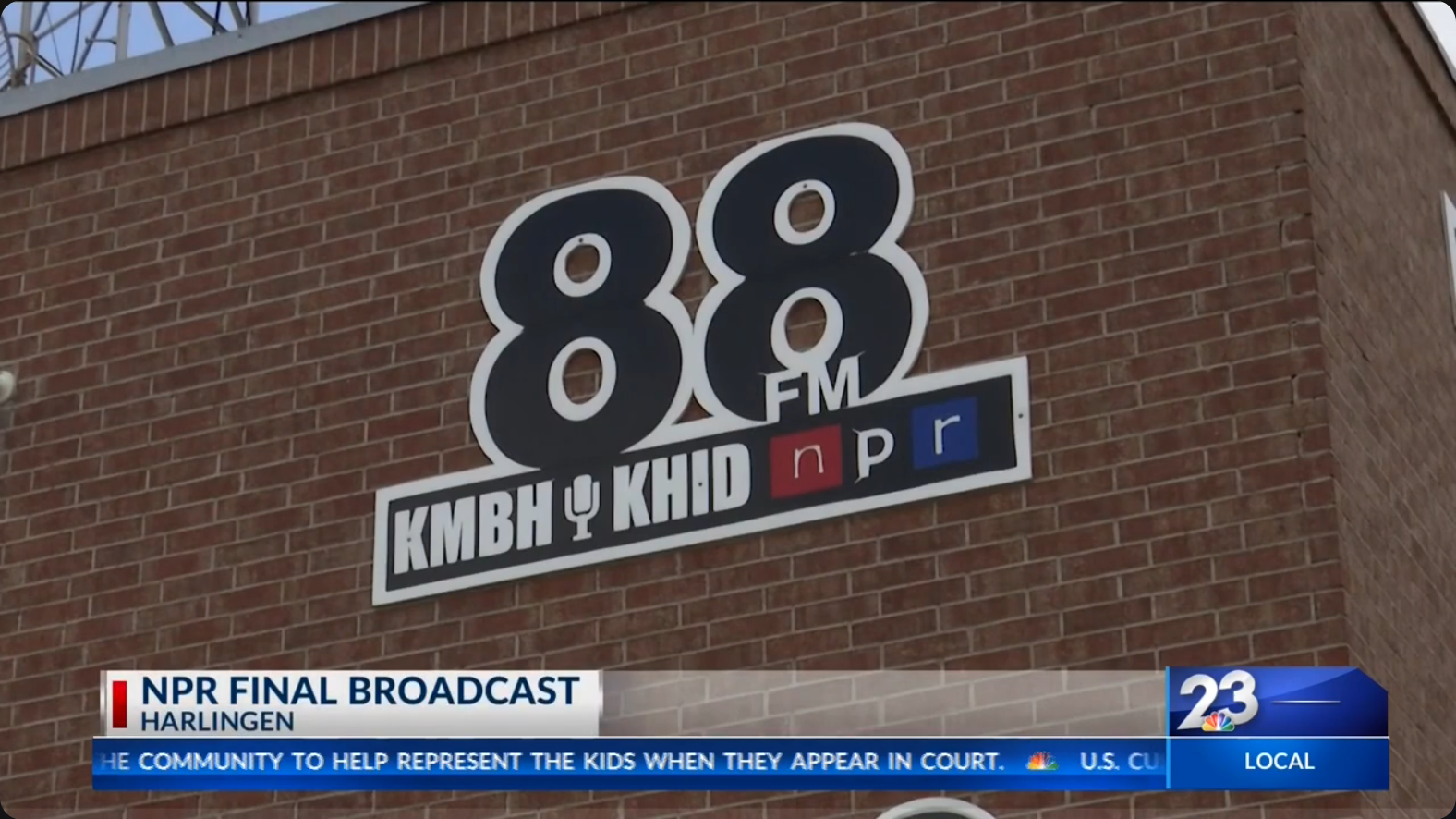The Vanishing of Public Media
Deborah L. Jaramillo / Boston University

The southernmost region of Texas, the Rio Grande Valley, includes four counties, a university in the UT system, multiple major hospitals, a substantial agricultural sector, a beach resort town, and a sizable Homeland Security presence. According to the U.S. Census Bureau, between 2018 and 2022 the percentage of Valley residents living in poverty ranged from 22% in Cameron County to 32% in Starr County. The city of Harlingen sits centrally in the region and until recently had been the site of KMBH, a PBS member station. I grew up watching PBS programming because of KMBH. I also got my first post-undergrad job there, working in production and then programming. Unique among member stations, KMBH was managed by a priest, and the broadcast license holder was the Brownsville Dioceses. As a result, many local productions consisted of Catholic church services, shot on location or in the KMBH studio. Other local programs included a high-profile birding program that was picked up by stations around the country, as well as a popular Tex-Mex cooking program.
Public television is not confined to the screen. For three decades, the Valley had access to all that PBS can mean in a community like this one. Yes, television programming met people in their homes, but active outreach meant KMBH met people in their communities. During my brief time there, I saw how the former programming director prioritized educational development. On a shoestring budget, KMBH staff created fun and meaningful events for children, many of whom were from low-income immigrant families. For these families, cable subscriptions were not an option, so over-the-air television offered a vital educational supplement to public school.
Operated by RGV Educational Broadcasting since 1984, KMBH was not the first attempt by the Catholic Diocese of Brownsville to get a public television station up and running. A 1979 article in Texas Monthly described the turbulent journey to launch KZLN, which “would have been the first minority-owned PBS station in the nation.”[1] Short one grant to construct the station, the organization created by the Diocese to sponsor KZLN sought funds from the Department of Housing and Urban Development. To secure that money, the plan needed approval from the city where the station would be built. The mayor of Harlingen, as well as most city commissioners, opposed the plan, citing inevitable failure. That the station manager and general manager of KZLN were both Hispanic, and that the station would be the one broadcaster in the Valley to target low-income Mexican-Americans, imperiled the venture. Texas Monthly cites two key quotes as evidence, one from an anonymous city official who worried the station would become “a Chicano-type propaganda station” and the other from a Valley Morning Star editorial stating that “public television in the wrong hands can become a disturbing and a dangerous political instrument.”[2] KZLN eventually made it to air in 1982 but folded the following year. In 1984, the Diocese tried again, this time through the nonprofit RGV Educational Broadcasting and with a new call sign, KMBH.

The struggles continued. The station endured for thirty years, but mounting costs convinced the Diocese to sell in 2014. The non-commercial station’s sale to a commercial broadcaster faced no regulatory obstacle, though it did encounter opposition from U.S. Congressman Filemón Vela and Texas Representative Rubén Hinojosa, as well as from the former grassroots organization Equal Voice Network, which warned of consequences for the population most in need of PBS educational programming.[3] PBS member station KEDT of Corpus Christi tried to strike a deal with the purchaser, R Communications, to distribute its programming on a subchannel, but that deal fell through.[4] Ultimately, R Communications, primarily a border-based radio group, continued to air PBS programming without CPB funding via a subchannel of KMBH until 2018 when the station went off the air due to a damaged transmitter.[5] In 2019, R Communications sold KMBH to Entravision Communications, a media company targeting Spanish-speaking markets. Now, PBS programming reaches Valley residents on a KCWT subchannel but without member station status and without a local production, programming, and marketing staff to integrate the PBS mission into the community.[6 ]
As Valley music fans know, KMBH was a TV and radio station; KMBH-FM (later 88 FM) carried NPR programming as well as local music programs. It was housed in a small, cramped space that sat above the television studio. There, the staff championed unique music programming that spoke to multiple audiences. Jazz and classical sat alongside rock and regional Mexican-American music, a combination that did not always sit well with listener supporters. I recall the program Acordeones de Tejas created some anguish for listeners who felt conjunto music had no place on the NPR station. The tension between income-secure donors and the “public” of Valley public radio caused a bit of a dust-up, exposing racial tensions in the process, but did no permanent damage. The show continued and even expanded to television. Sadly, in 2019, the Brownsville Diocese sold 88 FM to Immaculate Heart Media, branded as Relevant Radio, a conservative Catholic network.[7] Efforts to bring NPR back to the Valley have faced challenges related to copyright and frequency availability along the border.

There is so much more to say about the continued importance of over-the-air TV to low-income viewers, the role of public media along the southern border, and the role of the Diocese in linking the Valley to the national public radio and television systems. The uphill battle to create a minority-run station targeting a marginalized population in deep south Texas is a story in and of itself. Ultimately, KMBH would not become a hub for Chicano activism, as city officials feared. The Catholic management notoriously refused to air progressive or critical programming on occasion and was even investigated by the Corporation for Public Broadcasting for several violations. But poor decision-making at the top shouldn’t diminish what KMBH meant to Valley children for thirty years and what it could have meant for the next thirty.
Image Credits:
- Logo for KMBH, the Rio Grande Valley’s (former) PBS Station. Retrieved from version archived Feb. 10, 2012.
- Without a PBS member station and a local production, programming, and marketing staff, Valley residents, especially low-income and immigrant families, lack community-building and vital educational supplements. Photo by Gaspar Uhas on Unsplash.
- News broadcast about the closing of KMBH’s FM radio station (author’s screenshot).
- John Bloom, “Why Can’t Juan Watch TV?” Texas Monthly, August 1979, 56. [↩]
- John Bloom, “Why Can’t Juan Watch TV?” 58. [↩]
- Dru Sefton, “PBS may continue on commercial multicast channel in South Texas,” Current, April 3, 2014, https://current.org/2014/04/kmbh-sale/. [↩]
- Dru Sefton, “Owner of sole public TV signal in Rio Grande Valley hints at possible sale,” Current, March 7, 2018, https://current.org/2018/03/owner-of-sole-public-tv-signal-in-rio-grande-valley-hints-at-possible-sale/. [↩]
- Sefton, “Owner of sole public TV signal.” [↩]
- Steve Taylor, “Valley’s PBS station is being sold to Entravision,” Rio Grande Guardian, September 2, 2019, https://riograndeguardian.com/valleys-pbs-station-is-being-sold-to-entravision/. [↩]
- “Valley’s NPR Station Says Farewell,” ValleyCentral.com, May 30, 2019, https://www.valleycentral.com/news/local-news/valleys-npr-station-says-farewell/. [↩]